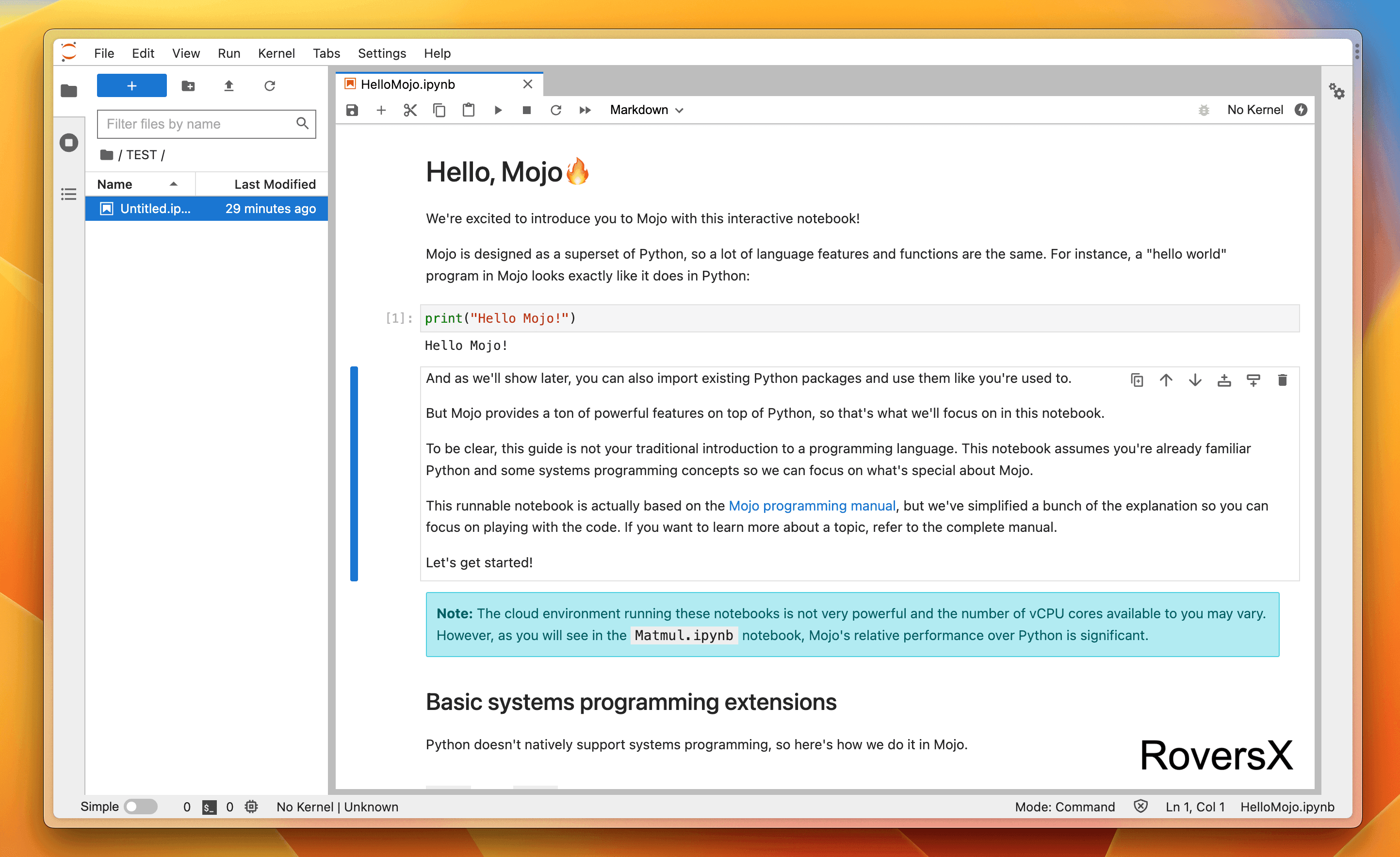Mojo🔥 , An Innovative Language Create for Every AI 🤖️
Introduction 🚀
Mojo, a pioneering AI-focused programming language by Modular, fuses Python’s user-friendly syntax with systems and metaprogramming capabilities. It offers the speed of C, Python ecosystem interoperability, and portability. Modular’s Mojo enables efficient, powerful, and accessible AI development with the added benefit of leveraging Python’s vast library ecosystem.
| Feature | Mojo | Python |
|---|---|---|
| Syntax | Similar to Python, but with some differences | Familiar and simple, but sometimes verbose |
| Metaprogramming | Supports macros, templates, and DSLs | Supports decorators, generators, and eval |
| Systems programming | Supports low-level code interactions | Requires external libraries or modules for low-level code |
| Python interoperability | Supports importing any Python module or function | N/A |
| Performance | Compiles to native machine code that’s faster than C | Interpreted or compiled to bytecode that’s slower than C |
Mojo tackles AI programming limitations head-on! While Python is popular, it struggles with performance and parallelism. C and C++ are zippy but complex, and while Julia, Rust, and Swift show promise, their user bases and libraries are still growing 🌱.
Mojo, our hero, combines Python’s usability with C’s speed ⚡. It’s simple to learn and write, with Python-like syntax. Mojo’s metaprogramming lets you generate or modify code on the fly 🔄, perfect for creating DSLs, macros, templates, and more! With systems programming, Mojo lets you tinker with hardware and operating systems 🔧. Plus, you can use any Python library or module with Mojo’s Python interoperability 🐍.
Advantages of Mojo:
- Faster and more efficient than Python
- Simpler and easier than C and C++
- More expressive and powerful than other languages
- Compatible and interoperable with Python
Disadvantages of Mojo:
- Still in development and not open-sourced
- Has some sharp edges and missing features
- Smaller community and fewer resources than Python
Mojo Playground 🎮
Mojo is still in development and not yet open-sourced, so you cannot install it locally on your computer. However, you can access the Mojo Playground, which is a hosted JupyterHub where you can try coding with an early version of Mojo.
Once you have access to the Mojo Playground, you can create a new notebook and start writing Mojo code. You can also run a Mojo program from a terminal just like you can with Python.
The Mojo Playground also provides some Jupyter notebooks that demonstrate how to use Mojo for various tasks, such as web development, scientific computing, game development, systems programming, and artificial intelligence. You can find them here: https://docs.modular.com/mojo/notebooks.
Example Mojo Program 🖊️
Here is a example pragram from their JupyterLab
Basic Extensions
Python doesn’t natively support systems programming, so here’s how we do it in Mojo.
let and var declarations
Inside a function, you can assign values to a name and it implicitly creates a function-scope variable just like in Python. This provides a very dynamic and low ceremony way to write code, but it is also a challenge for two reasons:
- Systems programmers often want to declare that a value is immutable.
- They may want to get an error if they mistype a variable name in an assignment.
To support this, Mojo supports let and var declarations, which introduce a new scoped runtime value: let is immutable and var is mutable. These values use lexical scoping and support name shadowing:
1 | def your_function(a, b): |
let and var declarations also support type specifiers, patterns, and late initialization:
1 | def your_function(): |
Learning More About Mojo 📚
If you want to learn more about Mojo, you can check out the following resources:
- The official website: https://www.modular.com/mojo
- The documentation: https://docs.modular.com/mojo
- The GitHub repo: https://github.com/modularml/mojo
- The Discord server: https://discord.gg/6w7z8ZKj
Author:New Bing , GPT4 and One



